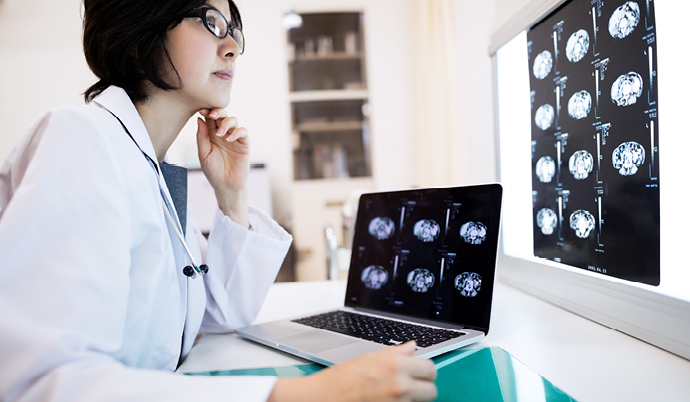Safe, Reliable Diagnostic Scans
Nuclear medicine procedures use a small dose of radiation to image your organs, tissue and bones. These scans give your physician a clear picture of your health and help diagnose medical conditions. Meet with our nuclear medicine team for safe procedures that provide accurate results.
Nuclear medicine tests can pick up conditions that X-rays or other imaging tests may miss. For example, some bone fractures can only be seen on a nuclear medicine scan. Your doctor will decide what kind of diagnostic testing you need.
How Nuclear Medicine Scans Work
Before a test, you will ingest or inject a radioisotope, which will highlight the area your doctor needs to image. Radioisotopes are a small, safe dose of radiation commonly used in medicine. A special nuclear camera detects the radiation from the radioisotope and uses it to create an image.
These tests are very safe. During a scan, you’re exposed to only a small amount of radiation. All traces of the radioisotope will leave your system in 12 to 24 hours after your test. Children can safely undergo a nuclear medicine procedure. Talk to your physician if you have concerns.
Nuclear medicine procedures are non-invasive and usually painless. Most patients experience no side effects after their tests.
A Clear Picture of Your Health
The benefits of a nuclear medicine procedure far outweigh its minute risks. Doctors use these scans to diagnose injuries and illnesses accurately. They often incorporate what they learn from the images into treatment plans. You’ll get a more precise diagnosis and a treatment plan tailored to your medical condition after a nuclear medicine procedure.
There are several types of nuclear medicine tests, including:
- PET scans: Positron emission tomography (PET) scans use a radioactive tracer to show the metabolism of an organ or tissue. It can identify the location of diseases and their spread. Doctors use it to diagnose neurological disorders, cancers, heart conditions, lung diseases and more.
- Bone scans: Bone scans look at your whole skeleton for bone abnormalities. These scans use nuclear radiology and are most commonly used to identify the spread of cancer. They are also used to look for bone injuries, infections and other bone conditions.
- Gallium scans: A few days before your test, your doctor will inject gallium citrate into a vein. This drug will bind to cancer cells and inflamed areas in your body. A camera will then identify “hot spots” of gallium citrate.
- MIBG scans: The substance MIBG collects around certain types of tumors. MIBG scans combine MIBG with radioactive iodine and take pictures of MIBG hot spots.
These tests are each used to diagnose different conditions such as:
- Alzheimer’s disease
- Cancer
- Dementia and neurological disorders
- Endocrine disorders
- Gallbladder diseases
- Gastrointestinal conditions
- Heart conditions
- Thyroid disease
Talk to your doctor about your nuclear medicine testing options.
Find a Location
Find a Doctor
Learn More

Nuclear Medicine Facts
What is nuclear medicine? How are nuclear medicine scans done? What are the most common tests? Learn the answers to common questions about nuclear medicine.
Sanford Health News
-
background-image
College comes within reach for Sanford employee scholars
Some are first in their family to attend college, while others are pursuing new careers -
background-image
Sanford Health recognized by Becker’s as a top place to work
Professional development, diverse workplaces, wellness benefits among reasons for ranking
Classes & Events
-
background-image
Birthcenter Tours
Sat 04/20/24 1:00 PM - Sat 04/20/24 1:45 PM
Sanford Medical Center Bismarck -
background-image
Post-Natal Yoga
Sun 04/21/24 1:30 PM - Sun 04/21/24 2:30 PM
Sanford Family Wellness Center
